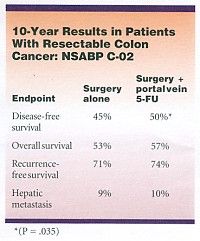Fluorouracil Portal Vein Infusion Improves Disease-Free Survival
WASHINGTON-Disease-free survival improved significantly for patients with resectable colon cancer who received portal vein infusion of fluorouracil (5-FU) after surgery, said Mark S. Roh, MD, of the National Surgical Adjuvant Breast and Bowel Project (NSABP) Operations and Biostatistical Center, Pittsburgh. Patients did not, however, experience any improvement in their rate of liver metastasis, he added.
WASHINGTONDisease-free survival improved significantly for patients with resectable colon cancer who received portal vein infusion of fluorouracil (5-FU) after surgery, said Mark S. Roh, MD, of the National Surgical Adjuvant Breast and Bowel Project (NSABP) Operations and Biostatistical Center, Pittsburgh. Patients did not, however, experience any improvement in their rate of liver metastasis, he added.
Speaking at the 54th Annual Cancer Symposium of the Society of Surgical Oncology, Dr. Roh mentioned a 1979 study that found increased survival and decreased hepatic metastasis among colon cancer patients who received 7 days of 5-FU via the portal vein.
Because the portal vein serves as the route of metastasis to the liver, the current trial (NSABP C-02) investigated the effect on survival and liver metastasis of infusing 5-FU directly into the portal vein of patients undergoing colectomy for potentially curable colon adenocarcinomas.
Between 1984 and 1988, 438 patients with interabdominal colon carcinomas were randomized before surgery to surgery with or without continuous infusion of 5-FU through the portal vein.

The site of cannulation was at the surgeon’s discretion. Findings at laparotomy, including Duke’s D and benign tumors, caused the exclusion of 262 patients from the trial.
Within 6 hours of surgery, infusion patients began on a 7-day regimen of 600 mg/m2/d of 5-FU and 5,000 units of sodium heparin. Patients generally tolerated the toxicity, which was mostly grade 1, "reasonably well," Dr. Roh said, although 14 patients were removed from the study because of toxicity.
During the first 2 years, disease-free survival "was pretty much identical" for the two groups, Dr. Roh stated, but after that the curves diverged, with the infusion group having significantly better disease-free survival at 10 years. Overall survival, although better in the infusion group, was not significantly different (see Table).
Liver metastasis did not differ between the two groups, he said. In fact, the infusion group had slightly more liver metastasis.
A meta-analysis of studies involving 4,000 patients revealed similar results, Dr. Roh observed. Although these studies contained many variables that complicated comparisons, they did not show a significant overall survival advantage for portal vein infusion, he said.